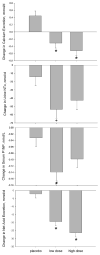Potassium Bicarbonate Supplementation Lowers Bone Turnover and Calcium Excretion in Older Men and Women: A Randomized Dose-Finding Trial
- PMID: 25990255
- PMCID: PMC4817273
- DOI: 10.1002/jbmr.2554
Potassium Bicarbonate Supplementation Lowers Bone Turnover and Calcium Excretion in Older Men and Women: A Randomized Dose-Finding Trial
Abstract
The acid load accompanying modern diets may have adverse effects on bone and muscle metabolism. Treatment with alkaline salts of potassium can neutralize the acid load, but the optimal amount of alkali is not established. Our objective was to determine the effectiveness of two doses of potassium bicarbonate (KHCO3 ) compared with placebo on biochemical markers of bone turnover, and calcium and nitrogen (N) excretion. In this double-blind, randomized, placebo-controlled study, 244 men and women age 50 years and older were randomized to placebo or 1 mmol/kg or 1.5 mmol/kg of KHCO3 daily for 3 months; 233 completed the study. The primary outcomes were changes in 24-hour urinary N-telopeptide (NTX) and N; changes in these measures were compared across the treatment groups. Exploratory outcomes included 24-hour urinary calcium excretion, serum amino-terminal propeptide of type I procollagen (P1NP), and muscle strength and function assessments. The median administered doses in the low-dose and high-dose groups were 81 mmol/day and 122 mmol/day, respectively. When compared with placebo, urinary NTX declined significantly in the low-dose group (p = 0.012, after adjustment for baseline NTX, gender, and change in urine creatinine) and serum P1NP declined significantly in the low-dose group (p = 0.004, adjusted for baseline P1NP and gender). Urinary calcium declined significantly in both KHCO3 groups versus placebo (p < 0.001, adjusted for baseline urinary calcium, gender, and changes in urine creatinine and calcium intake). There was no significant effect of either dose of KHCO3 on urinary N excretion or on the physical strength and function measures. KHCO3 has favorable effects on bone turnover and calcium excretion and the lower dose appears to be the more effective dose. Long-term trials to assess the effect of alkali on bone mass and fracture risk are needed.
Keywords: ACID-BASE; BICARBONATE; BONE; OSTEOPOROSIS; POTASSIUM.
© 2015 American Society for Bone and Mineral Research.
Conflict of interest statement
All authors state that they have no conflicts of interest.
Figures


References
-
- U.S. Department of Agriculture and U.S. Department of Health and Human Services. Dietary Guidelines for Americans, 2010. 7. Washington, DC: U.S. Government Printing Office; Dec, 2010. [cited 2015 Jun 30]. Available from: http://www.cnpp.usda.gov/sites/default/files/dietary_guidelines_for_amer.... - PMC - PubMed
-
- Levey AS, Bosch JP, Lewis JB, Greene T, Rogers N, Roth D. A more accurate method to estimate glomerular filtration rate from serum creatinine: a new prediction equation. Modification of Diet in Renal Disease Study Group. Ann Intern Med. 1999;130:461–70. - PubMed
Publication types
MeSH terms
Substances
Grants and funding
LinkOut - more resources
Full Text Sources
Other Literature Sources
Medical

